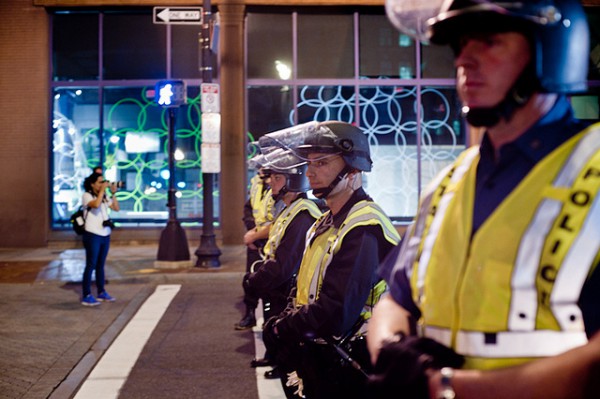

The city of Boston will pay $170,000 to settle a lawsuit that forced a landmark ruling on a citizen’s First Amendment right to record the activities of police officers in public. The settlement, announced today by the ACLU of Massachusetts, ends a case that produced a significant victory for those who believe citizens — and journalists — should have the right to record police activity in public places.
In October 2007, Glik he said he saw police officers arresting a teenager in the most public of places — the Boston Common — and pulled out his cellphone to start recording video. Within minutes, he was under arrest for illegal electronic surveillance under Massachusetts’ wiretapping statute.
The case raised the hackles of both privacy groups and news companies — including The New York Times Co., Dow Jones, NBC Universal, and more who publicly came to Glik’s defense. All charges were dropped, but until recently the Boston Police Department had maintained for years that officers had the right to arrest people for recording their activity.
Glik sued the city, saying Boston police violated his First and Fourth Amendment rights. The First Circuit appeals court ruled unanimously last fall that Glik was “exercising clearly established First Amendment rights in filming the officers in a public space” and sent the case back to a lower court.
“When a U.S. Court of Appeals rules on a constitutional issue, even though that’s not binding in other federal circuits, it can be viewed as important guidance and precedent,” said Jeff Hermes, director of the Citizen Media Law Project at Harvard’s Berkman Center, which joined with news organizations in a friend-of-the-court brief supporting Glik.
“And the strength of the First Circuit’s statement, that this First Amendment right does exist, was so striking that it received much more attention than other police-recording incidents in other jurisdictions,” Hermes said.
The Boston Police Department has since reversed its stance. The officers involved in the Glik case were disciplined, and training materials were updated to tell officers “there is no right of arrest for public and open recordings” under the state’s wiretapping law.
“The law had been clear for years that openly recording a video is not a crime,” Glik said in a statement today. “It’s sad that it takes so much for police to learn the laws they were supposed to know in the first place. I hope Boston police officers will never again arrest someone for openly recording their public actions.”
Elaine Driscoll, a BPD spokeswoman, responded in an email:
In February 2010, the Boston police academy completed a Roll Call video for all officers in regards to the wiretap statute. This training continues to be a part of the in-service curriculum at the academy. The information has also been added to our e-learning curriculum (distance learning) for all officers. The academy also issued a training bulletin in November 2010. Commissioner Davis re-issued the training bulletin in October 2011.
I would not comment on the suit or its outcome. Updates in technology frequently present new circumstances for officers. We strive to keep our officers informed and updated to assist them in addressing new issues. For the last several years, we have reinforced to officers the issue of cell phone recording and their obligation to the wiretap statute.
Glik’s case was certainly not the last in Boston or elsewhere. Last fall, a 21-year-old man sued four Boston police officers who he said wrongfully arrested him for recording video of his friend’s arrest outside a police station. Earlier this month, Boston paid $1.4 million to settle with a man who said he suffers brain damage after he was tackled and beaten by a Boston police officer while trying to record video during a traffic stop.
Video-recording technology is now ubiquitous and pocket-sized, and suddenly the tools once available only to professional storytellers are now in the hands of millions of people. Precedent-setting cases like Glik’s can be a boon to news organizations, which have tussled with police departments for decades over the right to record from the front lines.
There are numerous documented cases of photojournalists being arrested while trying to cover the Occupy Wall Street protests last year. Miami photojournalist Carlos Miller — himself arrested three times for recording cops in public, he says — covers similar cases on his blog, Photography is Not a Crime.
“The First Amendment includes the freedom to observe and document the conduct of government officials, which is crucial to a democracy and a free society,” said Sarah Wunsch, an attorney with the ACLU of Massachusetts, in a statement. “We hope that police departments across the country will draw the right conclusions from this case.”
Photo of Boston police officers by JonPack used under a Creative Commons license.